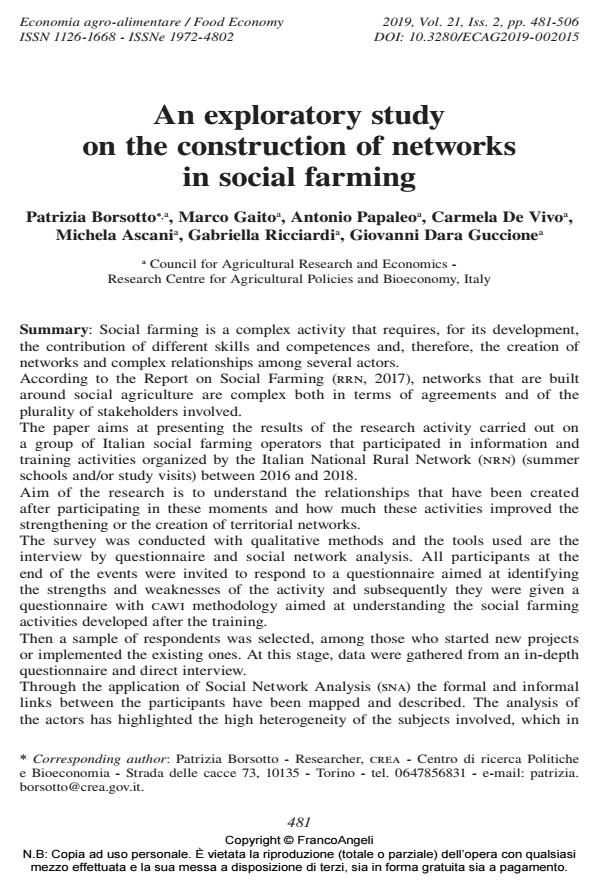An exploratory study on the construction of networks in social farming
Titolo Rivista ECONOMIA AGRO-ALIMENTARE
Autori/Curatori Patrizia Borsotto, Marco Gaito , Antonio Papaleo, Carmela De Vivo
Anno di pubblicazione 2019 Fascicolo 2019/2
Lingua Inglese Numero pagine 26 P. 481-506 Dimensione file 248 KB
DOI 10.3280/ECAG2019-002015
Il DOI è il codice a barre della proprietà intellettuale: per saperne di più
clicca qui
Qui sotto puoi vedere in anteprima la prima pagina di questo articolo.
Se questo articolo ti interessa, lo puoi acquistare (e scaricare in formato pdf) seguendo le facili indicazioni per acquistare il download credit. Acquista Download Credits per scaricare questo Articolo in formato PDF

FrancoAngeli è membro della Publishers International Linking Association, Inc (PILA), associazione indipendente e non profit per facilitare (attraverso i servizi tecnologici implementati da CrossRef.org) l’accesso degli studiosi ai contenuti digitali nelle pubblicazioni professionali e scientifiche.
Social farming is a complex activity that requires, for its development, the contribution of different skills and competences and, therefore, the creation of networks and complex relationships among several actors. According to the Report on Social Farming (rrn, 2017), networks that are built around social agriculture are complex both in terms of agreements and of the plurality of stakeholders involved. The paper aims at presenting the results of the research activity carried out on a group of Italian social farming operators that participated in information and training activities organized by the Italian National Rural Network (nrn) (summer schools and/or study visits) between 2016 and 2018. Aim of the research is to understand the relationships that have been created after participating in these moments and how much these activities improved the strengthening or the creation of territorial networks. The survey was conducted with qualitative methods and the tools used are the interview by questionnaire and social network analysis. All participants at the end of the events were invited to respond to a questionnaire aimed at identifying the strengths and weaknesses of the activity and subsequently they were given a questionnaire with cawi methodology aimed at understanding the social farming activities developed after the training. Then a sample of respondents was selected, among those who started new projects or implemented the existing ones. At this stage, data were gathered from an in-depth questionnaire and direct interview. Through the application of Social Network Analysis (sna) the formal and informal links between the participants have been mapped and described. The analysis of the actors has highlighted the high heterogeneity of the subjects involved, which in most cases is constituted by farmers. The network is not very cohesive due to the lack of links between many actors. However, it is an active and inclusive network characterized by redundant links that may be poorly efficient and an obstacle to its further expansion. Within the network, there are actors who simultaneously hold multiple roles representing multiple interests; the nrn no longer appears as a standalone unit that only performs an "institutional function" but as a social subject.
Parole chiave:Social farming, social innovation, connective agriculture, network.
Jel codes:O35, D85, L14
- Social innovation as a game changer in agriculture: A literature review Ana Lucia Fernandes da Silva, Jose Antonio Plaza‐Úbeda, Roberta Souza Piao, in Sustainable Development /2024 pp.4160
DOI: 10.1002/sd.2898 - Social farming and work inclusion: A systematic review of practices, challenges, and policy implications Veronica Rossi, Chiara Paffarini, Biancamaria Torquati, in NJAS: Impact in Agricultural and Life Sciences 2631925/2026
DOI: 10.1080/27685241.2026.2631925 - Social farming in high mountain regions: The case of the Aosta Valley in Italy Erika Fazari, Dario Musolino, in Economia agro-alimentare 3/2023 pp.1
DOI: 10.3280/ecag2022oa14053
Patrizia Borsotto, Marco Gaito , Antonio Papaleo, Carmela De Vivo, An exploratory study on the construction of networks in social farming in "ECONOMIA AGRO-ALIMENTARE" 2/2019, pp 481-506, DOI: 10.3280/ECAG2019-002015